I shouldn't care about these people. They're loathsome. The only one who's not complete slime is Chellak and he's the least interesting character, a sheep among wolves. He's not really a bad guy underneath, but he gets pushed around by everyone else, he's happy to execute the Doctor and Peri for no good reason and basically he's a loser. Everyone else is slime and you're looking forward to their deaths, hopefully in humiliating and painful ways.
The Caves of Androzani arguably shouldn't work. On first broadcast, when I saw it as a child, for me to an extent it didn't. It's bleak and unpleasant, like bathing in used engine oil. It certainly shouldn't have been taken as any kind of template. This is the kind of story that works in the hands of Peter Davison, Robert Holmes and Graeme Harper, but in the hands of Steve Cole or Trevor Baxendale makes you want to plant bombs in bookshops. Nevertheless in 1984 it worked like crazy. As so often 'twas Robert Holmes, the grand old man of Doctor Who, who could break the rules. His characters aren't just bastards. They're unbelievable screaming motherfuckers. Holmes hit a roll, a momentum with which he created a cast any one of whom could on their own have been the "unmatched throughout the series" highlight of another story. Sharaz Jek = work of genius. Stotz = has me backing away from the television. Morgus = makes the above look like Disney heroines. "Have the lift maintenance engineer shot." It's profoundly satisfying to see him get what he deserves, from Krau Timmin and then from Jek. I'm not sure what that glowing special effect did to him in episode four, but I'm happy to assume that it wasn't nice.
I could talk about these people for hours. Best of all, they're all completely different. It's no identikit parade of faceless macho mannequins, but a rich mix of villains that in that department outdoes just about any other work of fiction I can think of. Stotz is fascinating even before we see horrors like his terrifying scene with Krelper and the pill. He's a genuinely clever psychopath.
Then of course there's Jek. I discussed the others first to get them out of the way, since here there's so much to say. I'll be here a while. Everyone knows that Christopher Gable went in to read for another part, but on seeing the script fell in love with Sharaz Jek and went to Graeme Harper to ask for him instead. Forget the script for a moment. I've already discussed how astonishing it is that Robert Holmes pulled off what he did here, but I'm about to address the nuts and bolts of TV production. For Graeme Harper, the most script's terrifying line must have been: "You think bullets could stop me now?" That's the acid test. A bad actor or half-hearted direction could have sunk it like a stone and basically killed the whole story, which had all been building up to that confrontation. Why don't Morgus and Stotz just blast down Jek on the spot? Think about it. The guy should be Swiss cheese. In any other story, we'd be rolling our eyes and hooting at the TV... but the televised production doesn't even let you blink. You believe Jek! One truly feels that mere bullets wouldn't do the job. Admittedly the script has already made it clear that he's extremely hard to kill, but by that point our guts are screaming that this man is practically superhuman.
A further point of interest is that Sharaz Jek is an operatic character in a grittily realistic production. In a perverse way John Normington plays up Morgus by playing him down, with that psychotically tight self-control, but the world of Androzani is a million miles away from the plastic BBC corridors of much eighties Doctor Who. It has bullets, not laser beams. Its tough guys feel like tough guys, not ballet dancers and RADA graduates. Nevertheless amidst all this is a richly theatrical creation, using language as flamboyant as anything Holmes ever wrote. "You have the mouth of a prattling jackanapes." I'd kill to hear a Hollywood action hero say that. You can roll it around your tongue like wine, but furthermore it characterises Jek. It's horror as poetry, with luscious descriptions of grossness. When Jek says he wants Morgus's head, that's no metaphor. "Congealed in its own evil blood." "The flesh boiled, hanging from the bone." Jek's obsessed with physicality. He's besotted with Peri's beauty, mentally shattered by his own deformity and speaking a language of blood. It's perfect that he ended up being played by a professional dancer.
Eventually of course Jek becomes the only sympathetic character! He's acting from pure motives rather than greed. Love, or at least his twisted version, and hatred. They're beautiful in their clarity and he's dominated by them. He's like a terrifying child.
Then there's his best line. "I am mad."
I can't believe I'm reviewing a Davison story and I haven't talked about Peter Davison yet. This is one of those rare stories which you couldn't quite do with any other Doctor. The 5th Doctor, especially in Season 21, was the last good man in a bleak universe, which ultimately ended with him giving his life to become Colin Baker. Seasons 21 and 22 are twin epitomes of grossness, but in opposite ways. Colin Baker's era had a flamboyance, a larger than life quality that at its best gave us the likes of Vengeance on Varos. A Davison story on the other hand was always more human and real, as was exemplified in this final farewell. He's a hero in the fullest sense. For the Doctor as a character, I think this remains his finest hour in all his lives since 1963.
The Colin Baker era's stabs at tragedy (Lytton, Oscar Botcherby) were always fumbling and awkward. In contrast there's something uncomfortable about Resurrection of the Daleks and Caves of Androzani that few eras ever attained. Plus of course this story shows Davison's dark sense of humour, letting him stand up to the psychos with deliciously dry sarcasm that's flippant but always purposeful. Watch his first scene with Chellak. That line where he asks for a chair. He's deliberately testing the general. Then in the detention cell in episode one he's asking all the right questions, having already basically worked out the truth about both Salateen and Morgus. This is my 5th Doctor, the one who had Turlough pegged almost from the beginning but never said a word.
His finest moment in this finest moment is of course part three's cliffhanger. Obviously it ends with Davison's toe-tingling "not going to let you stop me now" speech, but personally I love the whole scene all the way from "Ah, Stotzy, have you had a good rest?" and "Sorry, seems to be locked".
Even his relationship with Peri is interesting. She's just as sarcastic, whiny and unenthusiastic as she would be in Season 22, but Davison lets it all roll off him. He's so much more tolerant than in his early days with Adric, Nyssa and Tegan. In fairness he didn't choose any of them; they're miscellaneous orphans who stowed away or got dumped on him, and it's already the end of Castrovalva before he's in a position to do anything about it. (Note that he spends the entirety of Season Nineteen trying to get rid of Tegan, albeit at her request, and he's not exactly reluctant to lose her when they finally reach Heathrow in Time-Flight.) Peri on the other hand was offered her place on the TARDIS.
Plus of course she has the right idea. Androzani really is horrible. Anyone with a brain would want to get away. The Doctor is the hero, but she's the ordinary girl trapped in a nightmare. She's terrified by Sharaz Jek, to the point where she jumps at the Doctor's hand hitting her shoulder.
The regeneration is different too. Everyone knows about the fan theory about the episode three cliffhanger, with the Doctor feeling woozy just when Harper reused the regeneration special effect. He pulls himself together and we get on with the scene. However there's a further regeneration foreshadowing when the Doctor goes down for the milk of the Queen Bat and hears voices, a multiple echo of Sharaz Jek saying, "She's dying, Doctor." Eventually the old faces parade works surprisingly well, trumping the similar idea at the end of Logopolis by bringing the actors into the studio to record new lines. We'd never seen a regeneration like this before, a slow poisoning in which the Doctor basically spends four episodes dying by degrees. Even he says, "It feels different this time."
Continuity menks might surmise that Androzani's backstory is similar to that of Robots of Death. "Where are you from, Earth?" "As they used to say on Earth, every cloud has a strontium lining." There's also the fact that Jek's androids get confused by the Doctor's alien physiology, making it look like a fairly human-centric universe.
Oh, and Morgus's asides to camera. What the hell? As soon as your attention's been drawn to them, they're unbelievable. I love them.
I like the plot. It's hardly an original observation, but I'll say it again... The Caves of Androzani is an SF historical. There aren't any diabolical menaces or plans to destroy the universe, but simply the passion and violence of the characters. We don't need aliens. Everyone's quite enough of a threat to each other. Okay, there's the Magma Beast, but it's little more than a lava flow on legs. There's nothing intelligent or consciously antagonistic about it. Meanwhile for once the Doctor isn't trying to beat the bad guy or save the world, but simply wants to get back to the TARDIS.
I'd always vaguely approved of Robert Holmes, but rewatching all these old stories has heightened my appreciation of him. He's a storyteller, a wit and a wordsmith, but moreover time after time he does things with Doctor Who that no one before or since has thought to do. The Caves of Androzani is unique. It's spiky, uncomfortable and I didn't particularly enjoy it when I was eleven, but it's a breathtaking achievement.

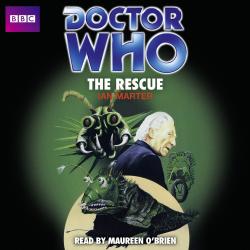
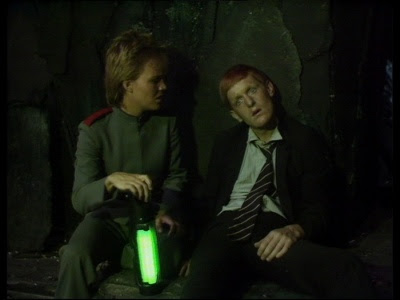 This is also one of those rare stories that enabled
This is also one of those rare stories that enabled 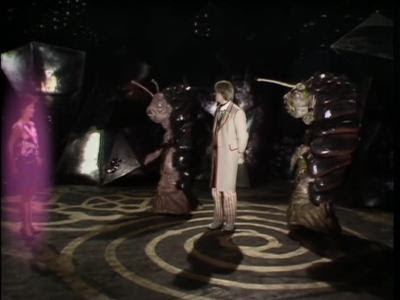 The Gravis was an interesting idea, but its threats did seem a little easy to ignore -the novelisation does much to address this so you could really feel the unease of whether he'd grasp that Tegan was not a Gallifreyan serving machine after all. Hmm, actually, he is a bit thick not to realise the Doctor's little tricks even down to his eventual defeat by his own hands!
The Gravis was an interesting idea, but its threats did seem a little easy to ignore -the novelisation does much to address this so you could really feel the unease of whether he'd grasp that Tegan was not a Gallifreyan serving machine after all. Hmm, actually, he is a bit thick not to realise the Doctor's little tricks even down to his eventual defeat by his own hands!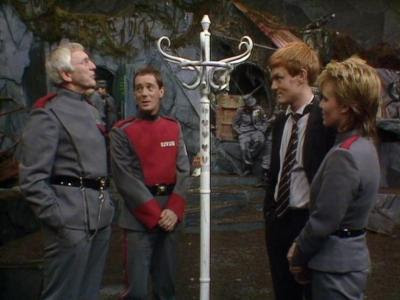 Even back at broadcast I thought it strange that the Doctor would be going on about his hatstand, not knowing how much of a mcguffin that would be (or even what the word meant back then :)). It's later poingnancy as being the only remaining part of the ship was a real impact back then, even if I knew we had several more stories to go so the TARDIS couldn't really be gone. Actually, at the time I suspected the chameleon circuit had worked ... but no it was actually dispelled into separate components within our own natural dimensions instead and providing a magical moment when Tegan comes across roundels in the tunnels - still highly effective even now!
Even back at broadcast I thought it strange that the Doctor would be going on about his hatstand, not knowing how much of a mcguffin that would be (or even what the word meant back then :)). It's later poingnancy as being the only remaining part of the ship was a real impact back then, even if I knew we had several more stories to go so the TARDIS couldn't really be gone. Actually, at the time I suspected the chameleon circuit had worked ... but no it was actually dispelled into separate components within our own natural dimensions instead and providing a magical moment when Tegan comes across roundels in the tunnels - still highly effective even now!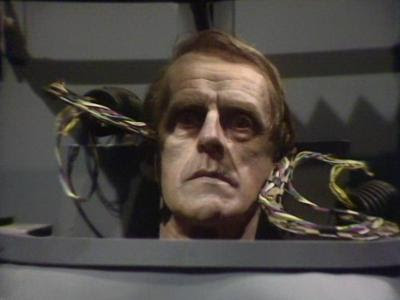 Plenty of bits to catch the eye in the story, but quite a lot cut out too it seems (which you can see in the deleted scenes bit). I must say the episode pace is pretty good so the extra to-ing and fro-ing cut helps the broadcast version keep running well. And it wasn't until just now watching it that I realised that episode three is essentially just "running around corridors!". Speaking of which, a good "revere-lation" (sorry!) at the end of the ep with Ron Jones choosing not to use a "crash-in to the Doctor's face" for once - hoorah! - especially with the nasty-looking excavation machine turning up (which again the novelisation makes even nastier than on screen).
Plenty of bits to catch the eye in the story, but quite a lot cut out too it seems (which you can see in the deleted scenes bit). I must say the episode pace is pretty good so the extra to-ing and fro-ing cut helps the broadcast version keep running well. And it wasn't until just now watching it that I realised that episode three is essentially just "running around corridors!". Speaking of which, a good "revere-lation" (sorry!) at the end of the ep with Ron Jones choosing not to use a "crash-in to the Doctor's face" for once - hoorah! - especially with the nasty-looking excavation machine turning up (which again the novelisation makes even nastier than on screen).





